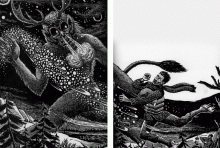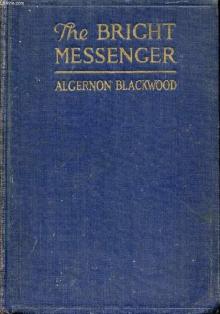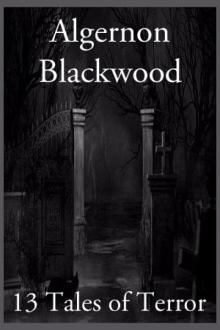- Home
- Algernon Blackwood
The Garden of Survival
The Garden of Survival Read online
Produced by David Moynihan. HTML version by Al Haines.
The Garden of Survival
by
Algernon Blackwood
I
IT will surprise and at the same time possibly amuse you to know thatI had the instinct to tell what follows to a Priest, and might havedone so had not the Man of the World in me whispered that fromprofessional Believers I should get little sympathy, and probablyless credence still. For to have my experience disbelieved, orattributed to hallucination, would be intolerable to me. Psychicalinvestigators, I am told, prefer a Medium who takes no cashrecompense for his performance, a Healer who gives of his strangepowers without reward. There are, however, natural-born priests whoyet wear no uniform other than upon their face and heart, but since Iknow of none I fall back upon yourself, my other half, for in writingthis adventure to you I almost feel that I am writing it to myself.
The desire for confession is upon me: this thing must out. It is astory, though an unfinished one. I mention this at once lest,frightened by the thickness of the many pages, you lay them asideagainst another time, and so perhaps neglect them altogether. Astory, however, will invite your interest, and when I add that it istrue, I feel that you will bring sympathy to that interest: thesetogether, I hope, may win your attention, and hold it, until youshall have read the final word.
That I should use this form in telling it will offend your literarytaste--you who have made your name both as critic and creativewriter--for you said once, I remember, that to tell a story inepistolary form is a subterfuge, an attempt to evade the difficultmatters of construction and delineation of character. My story,however, is so slight, so subtle, so delicately intimate too, that aletter to some one in closest sympathy with myself seems the onlyform that offers.
It is, as I said, a confession, but a very dear confession: I burn totell it honestly, yet know not how. To withhold it from you would beto admit a secretiveness that our relationship has never known--outit must, and to you. I may, perhaps, borrow--who can limit thesharing powers of twin brothers like ourselves?--some of the skillyour own work spills so prodigally, crumbs from your writing-table,so to speak; and you will forgive the robbery, if successful, as youwill accept lie love behind the confession as your due.
Now, listen, please! For this is the point: that, although my wife isdead these dozen years and more--I have found reunion and I love.Explanation of this must follow as best it may. So, please mark tiepoint which for the sake of emphasis I venture to repeat: that I knowreunion and I love.
With the jealous prerogative of the twin, you objected to thatmarriage, though I knew that it deprived you of no jot of myaffection, owing to the fact that it was prompted by pity only,leaving the soul in me wholly disengaged. Marion, by her steadyrefusal to accept my honest friendship, by her persistent admirationof me, as also by her loveliness, her youth, her singing, persuadedme somehow finally that I needed her. The cry of the flesh, whichher beauty stimulated and her singing increased most strangely,seemed raised into a burning desire that I mistook at the moment forthe true desire of the soul. Yet, actually, the soul in me remainedaloof, a spectator, and one, moreover, of a distinctly lukewarm kind.It was very curious. On looking back, I can hardly understand it evennow; there seemed some special power, some special undiscovered tiebetween us that led me on and yet deceived me. It was especiallyevident in her singing, this deep power. She sang, you remember, toher own accompaniment on the harp, and her method, though so simpleit seemed almost childish, was at the same time charged with a greatmelancholy that always moved me most profoundly. The sound of hersmall, plaintive voice, the sight of her slender fingers that pluckedthe strings in some delicate fashion native to herself, the tiny footthat pressed the pedal--all these, with her dark searching eyes fixedpenetratingly upon my own while she sang of love and love'sendearments, combined in a single stroke of very puissant andseductive kind. Passions in me awoke, so deep, so ardent, soimperious, that I conceived them as born of the need of one soul foranother. I attributed their power to genuine love. The followingreactions, when my soul held up a finger and bade me listen to herstill, small warnings, grew less positive and of ever less duration.The frontier between physical and spiritual passion is perilouslynarrow, perhaps. My judgment, at any rate, became insecure, thenfloundered hopelessly. The sound of the harp-strings and of Marion'svoice could overwhelm its balance instantly.
Mistaking, perhaps, my lukewarm-ness for restraint, she led me at lastto the altar you described as one of sacrifice. And your instinct,more piercing than my own, proved only too correct: that which I heldfor love declared itself as pity only, the soft, affectionate pity ofa weakish man in whom the flesh cried loudly, the pity of a man whowould be untrue to himself rather than pain so sweet a girl byrejecting the one great offering life placed within her gift. Shepersuaded me so cunningly that I persuaded myself, yet was not awareI did so until afterwards. I married her because in some manner Ifelt, but never could explain, that she had need of me.
And, at the wedding, I remember two things vividly: the expression ofwondering resignation on your face, and upon hers--chiefly in theeyes and in the odd lines about the mouth--the air of subtle triumphthat she wore: that she had captured me for her very own at last, andyet--for there was this singular hint in her attitude andbehaviour--that she had taken me, because she had this curious deepneed of me.
This sharply moving touch was graven into me, increasing thetenderness of my pity, subsequently, a thousandfold. The necessitylay in her very soul. She gave to me all she had to give, and in sodoing she tried to satisfy some hunger of her being that lay beyondmy comprehension or interpretation. For, note this--she gave herselfinto my keeping, I remember, with a sigh.
It seems as of yesterday the actual moment when, urged by my vehementdesires, I made her consent to be my wife; I remember, too, thedoubt, the shame, the hesitation that made themselves felt in mebefore the climax when her beauty overpowered me, sweeping reflectionutterly away. I can hear to-day the sigh, half of satisfaction, yethalf, it seemed, of pain, with which she sank into my arms at last,as though her victory brought intense relief, yet was not whollygamed in the way that she had wanted. Her physical beauty, perhaps,was the last weapon she had wished to use for my enslavement; sheknew quite surely that the appeal to what was highest in me had notsucceeded...
The party in our mother's house that week in July included yourself;there is no need for me to remind you of its various members, nor ofthe strong attraction Marion, then a girl of twenty-five, exercisedupon the men belonging to it. Nor have you forgotten, I feel sure,the adroit way in which she contrived so often to find herself alonewith me, both in the house and out of it, even to the point ofsometimes placing me in a quasi-false position. That she tempted meis, perhaps, an overstatement, though that she availed herself ofevery legitimate use of feminine magic to entrap me is certainly thetruth. Opportunities of marriage, it was notorious, had beenfrequently given to her, and she had as frequently declined them; shewas older than her years; to inexperience she certainly had no claim:and from the very first it was clear to me--if conceited, I cannotpretend that I was also blind--that flirtation was not her object andthat marriage was. Yet it was marriage with a purpose that shedesired, and that purpose had to do, I felt, with sacrifice. Sheburned to give her very best, her all, and for my highest welfare. Itwas in this sense, I got the impression strangely, that she had needof me.
The battle seemed, at first, uneven, since, as a woman, she did notpositively attract me. I was first amused at her endeavours and herskill; but respect for her as a redoubtable antagonist soon followed.This respect, doubtless, was the first blood she drew from me, sinceit gained my attention and fixed my mind upon her presence. From that
moment she entered my consciousness as a woman; when she was near meI became more and more aware of her, and the room, the picnic, thegame of tennis that included her were entirely different from suchoccasions when she was absent, I became self-conscious. It wasimpossible to ignore her as formerly had been my happy case.
It was then I first knew how beautiful she was, and that her beautymade a certain difference to my mood. The next step may seem a bigone, but, I believe, is very natural: her physical beauty gave medefinite pleasure. And the instant this change occurred she was awareof it. The curious fact, however, is that, although aware of thisgain of power, she made no direct use of it at first. She did not drawthis potent weapon for my undoing; it was ever with her, but was eversheathed. Did she discern my weakness, perhaps, and know that thesubtle power would work upon me most effectively if left to itself?Did she, rich in experience, deem that its too direct use might wakena reaction in my better self? I cannot say, I do not know.... Everyfeminine art was at her disposal, as every use of magic pertaining toyoung and comely womanhood was easily within her reach. As you and Imight express it bluntly, she knew men thoroughly, she knew everytrick; she drew me on, then left me abruptly in the wrong, puzzled,foolish, angry, only to forgive me later with the most enchantingsmile or word imaginable. But never once did she deliberately makeuse of the merciless weapon of her physical beauty although--perhapsbecause--she knew that it was the most powerful in all her armoury.
For listen to this: when at last I took her in my arms with passionthat would not be denied, she actually resented it. She even soughtto repel me from her touch that had undone me. I repeat what I saidbefore: She did not wish to win me in that way. The sigh of happinessshe drew in that moment--I can swear to it--included somewhere, too,the pain of bitter disappointment.
The weapon, however, that she did use without hesitation was hersinging. There was nothing special either in its quality or skill; itwas a voice untrained, I believe, and certainly without ambition; herrepertoire was limited; she sang folk-songs mostly, the simplelove-songs of primitive people, of peasants and the like, yet sangthem with such truth and charm, with such power and conviction,somehow, that I knew enchantment as I listened. This, too, sheinstantly divined, and that behind my compliments lay hid a weaknessof deep origin she could play upon to her sure advantage. She did sowithout mercy, until gradually I passed beneath her sway.
I will not now relate in detail the steps of my descent, or if youlike it better, of my capture. This is a summary merely. So let mesay in brief that her singing to the harp combined with therevelation of her physical beauty to lead me swiftly to the pointwhere I ardently desired her, and that in this turmoil of desire Isought eagerly to find real love. There were times when I deceivedmyself most admirably; there were times when I plainly saw the truth.During the former I believed that my happiness lay in marrying her,but in the latter I recognised that a girl who meant nothing to mybetter self had grown of a sudden painfully yet exquisitelydesirable. But even during the ascendancy of the latter physicalmood, she had only to seat herself beside the harp and sing, for theformer state to usurp its place, I watched, I listened, and Iyielded. Her voice, aided by the soft plucking of the strings,completed my defeat. Now, strangest of all, I must add one otherthing, and I will add it without comment. For though sure of itstruth, I would not dwell upon it. And it is this: that in her singing,as also in her playing, in the "colour" of her voice as also in thevery attitude and gestures of her figure as she sat beside theinstrument, there lay, though marvellously hidden, something gross.It woke a response of something in myself, hitherto unrecognized,that was similarly gross....
It was in the empty billiard-room when the climax came, a calm eveningof late July, the dusk upon the lawn, and most of the house-partyalready gone upstairs to dress for dinner. I had been standing besidethe open window for some considerable time, motionless, and listeningidly to the singing of a thrush or blackbird in the shrubberies--whenI heard the faint twanging of the harp-strings in the room behind me,and turning, saw that Marion had entered and was there beside theinstrument. At the same moment she saw me, rose from the harp andcame forward. During the day she had kept me at a distance. I washungry for her voice and touch; her presence excited me--and yet Iwas half afraid.
"What! Already dressed!" I exclaimed, anxious to avoid a talk a deux."I must hurry then, or I shall be later than usual."
I crossed the room towards the door, when she stopped me with hereyes.
"Do you really mean to say you don't know the difference between anevening frock and--and this," she answered lightly, holding out theskirt in her fingers for me to touch. And in the voice was that hintof a sensual caress that, I admit, bewildered both my will andjudgment. She was very close and her fragrance came on me with herbreath, like the perfume of the summer garden. I touched the materialcarelessly; it was of softest smooth white serge. It seemed I touchedherself that lay beneath it. And at that touch some fire oflightning ran through every vein.
"How stupid of me," I said quickly, making to go past her, "but it'swhite, you see, and in this dim light I----"
"A man's idea of an evening frock is always white, I suppose, orblack." She laughed a little. "I'm not coming to dinner to-night,"she added, sitting down to the harp. "I've got a headache and thoughtI might soothe it with a little music. I didn't know any one washere. I thought I was alone."
Thus, deftly, having touched a chord of pity in me, she began to play;her voice followed; dinner and dressing, the house-party and mymother's guests, were all forgotten. I remember that you looked in,your eyes touched with a suggestive and melancholy smile, and asquickly closed the door again. But even that little warning failed tohelp me. I sat down on the sofa facing her, the world forgotten. And,as I listened to her singing and to the sweet music of the harp, thespell, it seemed, of some ancient beauty stole upon my spirit. Thesound of her soft voice reduced my resistance to utter impotence. Anaggressive passion took its place. The desire for contact, physicalcontact, became a vehement aching that I scarcely could restrain, andmy arms were hungry for her. Shame and repugnance touched me faintlyfor a moment, but at once died away again. I listened and I watched.The sensuous beauty of her figure and her movements, swathed in thatsoft and clinging serge, troubled my judgment; it seemed, as I sawher little foot upon the pedal, that I felt with joy its pressure onmy heart and life. Something gross and abandoned stirred in me; Iwelcomed her easy power and delighted in it. I feasted my eyes andears, the blood rose feverishly to my head. She did not look at me,yet knew that I looked at her, and how. No longer ashamed, but with afiery pleasure in my heart, I spoke at last. Her song had ended. Shesoftly brushed the strings, her eyes turned downwards.
"Marion," I said, agitation making my voice sound unfamiliar, "Marion,dear, I am enthralled; your voice, your beauty----"
I found no other words; my voice stopped dead; I stood up, tremblingin every limb. I saw her in that instant as a maid of olden time,singing the love-songs of some far-off day beside her nativeinstrument, and of a voluptuous beauty there was no withstanding. Thehalf-light of the dusk set her in a frame of terrible enchantment.
And as I spoke her name and rose, she also spoke my own, my Christianname, and rose as well. I saw her move towards me. Upon her face, inher eyes and on her lips, was a smile of joy I had never seen before,though a smile of conquest, and of something more besides that I mustcall truly by its rightful name, a smile of lust. God! thosemovements beneath the clinging dress that fell in lines of beauty toher feet! Those little feet that stepped upon my heart, upon my verysoul.... For a moment I loathed myself. The next, as she touched meand my arms took her with rough strength against my breast, myrepugnance vanished, and I was utterly undone. I believed I loved.That which was gross in me, leaping like fire to claim her gloriousbeauty, met and merged with that similar, devouring flame in her; butin the merging seemed cunningly transformed into the call of soul tosoul: I forgot the pity.... I kissed her, holding her to me sofiercely that she
scarcely moved. I said a thousand things. I knownot what I said. I loved.
Then, suddenly, she seemed to free herself; she drew away; she lookedat me, standing a moment just beyond my reach, a strange smile on herlips and in her darkened eyes a nameless expression that held bothjoy and pain. For one second I felt that she repelled me, that sheresented my action and my words. Yes, for one brief second she stoodthere, like an angel set in judgment over me, and the next we hadcome together again, softly, gently, happily; I heard that strange,deep sigh, already mentioned, half of satisfaction, half, it seemed,of pain, as she sank down into my arms and found relief in quietsobbing on my breast.
And pity then returned. I felt unsure of myself again. This was the loveof the body only; my soul was silent. Yet--somehow, in some strangehidden way, lay this ambushed meaning--that she had need of me, and thatshe offered her devotion and herself in sacrifice.

 Day and Night Stories
Day and Night Stories Four Weird Tales
Four Weird Tales The Wendigo
The Wendigo Three More John Silence Stories
Three More John Silence Stories The Garden of Survival
The Garden of Survival The Extra Day
The Extra Day The Bright Messenger
The Bright Messenger Collected Works of Algernon Blackwood
Collected Works of Algernon Blackwood The Empty House
The Empty House Three John Silence Stories
Three John Silence Stories 13 Tales of Terror
13 Tales of Terror A Prisoner in Fairyland
A Prisoner in Fairyland Ancient Sorceries And Other Weird Stories
Ancient Sorceries And Other Weird Stories The Algernon Blackwood Collection
The Algernon Blackwood Collection The First Algernon Blackwood Megapack: 36 Classic Tales of the Supernatural
The First Algernon Blackwood Megapack: 36 Classic Tales of the Supernatural John Silence, Physician Extraordinary
John Silence, Physician Extraordinary The Second Algernon Blackwood Megapack: 28 Classic Tales of the Supernatural
The Second Algernon Blackwood Megapack: 28 Classic Tales of the Supernatural The First Algernon Blackwood Megapack
The First Algernon Blackwood Megapack The Second Algernon Blackwood Megapack
The Second Algernon Blackwood Megapack